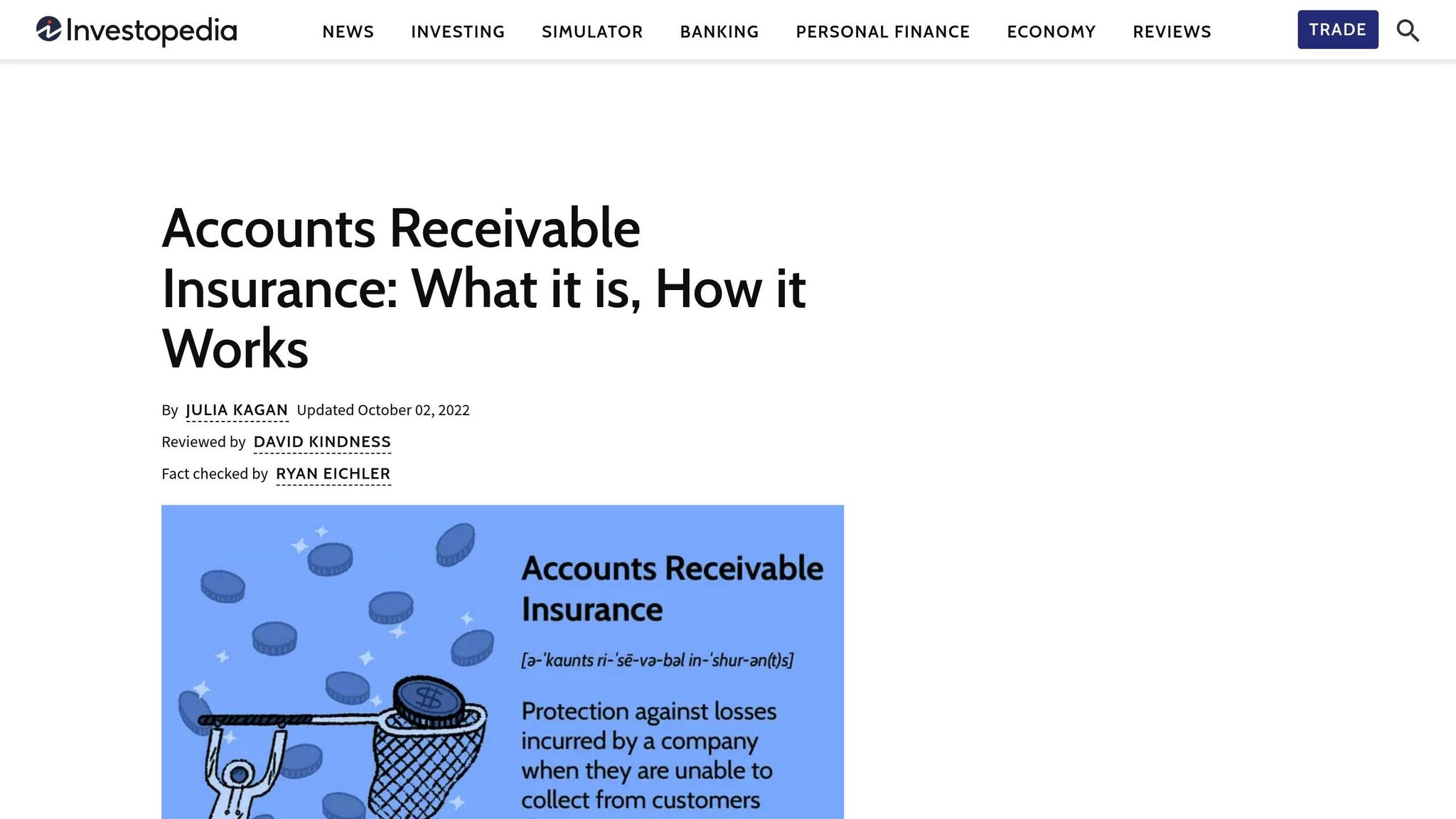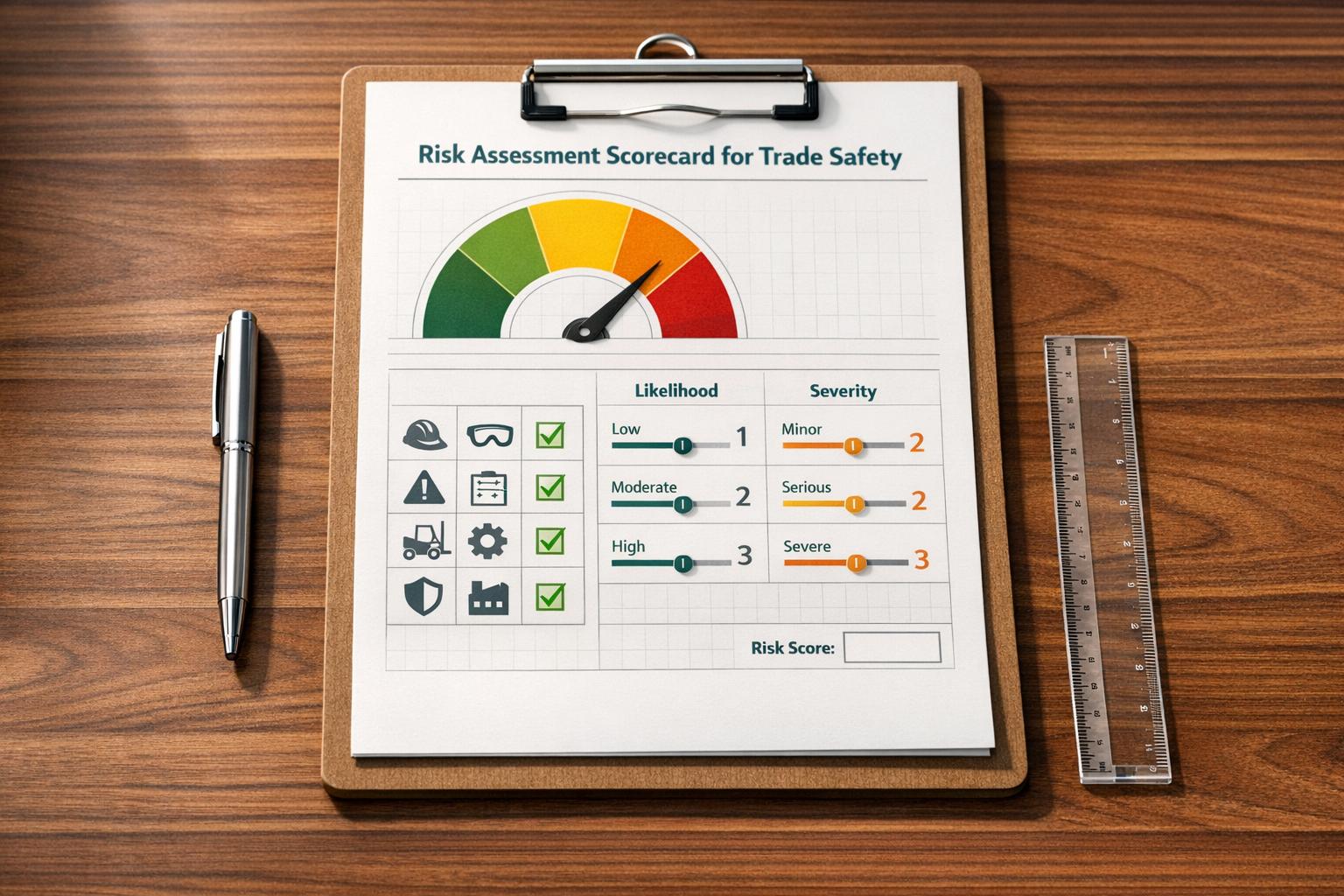Supplier defaults in international trade can disrupt operations, cause financial losses, and damage reputations. To protect against these risks, businesses need tailored insurance solutions that address supplier-specific challenges, such as non-delivery, quality issues, and political instability.
Here’s what you need to know:
- Supplier defaults can result from financial troubles, political unrest, currency fluctuations, or natural disasters.
- Standard insurance policies often don’t cover supplier-related risks, leaving businesses exposed.
- Tailored supplier default coverage includes protections like multi-currency coverage, political risk integration, and flexible terms.
- Accounts Receivable Insurance (ARI) provides additional support, such as risk assessments, claims management, and access to global networks.
Key Takeaway: Businesses involved in international trade should evaluate supplier risks and invest in customized insurance policies to safeguard operations and financial stability.
Challenges of Managing Supplier Default Risks
Risks in International Trade
Doing business across borders introduces layers of uncertainty that can turn even dependable suppliers into potential risks.
One major concern is political instability. Changes in government policies, new regulations, or outbreaks of civil unrest can abruptly prevent suppliers from fulfilling their commitments. For businesses, this means scrambling to secure alternative sources, often at a higher cost or with significant delays.
Currency fluctuations, particularly depreciation against the U.S. dollar, can also wreak havoc. When a supplier’s local currency weakens, their ability to purchase raw materials or maintain agreed pricing might collapse. This can lead to contract breaches or force businesses into renegotiations that aren’t in their favor.
Economic volatility – whether it’s inflation, a recession, or a banking crisis – can quickly destabilize even the most reliable suppliers. Under financial pressure, suppliers may struggle to maintain operations, leaving their partners in a lurch. Compounding this is the challenge of geographic distance in international trade, which makes it harder to keep tabs on a supplier’s financial and operational health. Warning signs often go unnoticed until it’s too late.
These challenges underscore the reality that traditional insurance often falls short in addressing the specific risks tied to supplier defaults.
Limitations of Standard Insurance Policies
Conventional trade credit insurance focuses on protecting sellers from buyer non-payment, but it doesn’t cover the risks tied to suppliers. These policies are designed to shield businesses from commercial risks, like a buyer’s inability or refusal to pay for goods or services they’ve received. While some policies may include coverage for political risks – such as currency instability or government upheaval – they typically exclude the risks stemming from a supplier’s failure to deliver.
Standard insurance policies don’t address supplier-specific issues like missed deliveries, quality problems, or operational breakdowns. This gap leaves businesses vulnerable, particularly in international trade, where extended lead times, bulk orders, and intricate logistics amplify the financial fallout of a supplier default.
The limitations of traditional coverage highlight the need for specialized policies tailored to manage supplier default risks, especially in the complex world of international trade.
What is Trade Credit Insurance? | Credit Insurance explained in 5 minutes
Tailored Coverage Solutions for Supplier Default
Standard policies often fall short when it comes to addressing the specific risks tied to supplier defaults in international trade. Tailored coverage solutions step in to fill this gap, offering protections designed to handle the unique challenges businesses face when suppliers fail to deliver.
Key Features of Tailored Supplier Default Coverage
Broad Event Protection is the cornerstone of these policies. They cover a wide range of supplier failures, including non-delivery, partial shipments, quality defects that make goods unsellable, and even complete shutdowns of supplier operations. This goes beyond basic non-performance, addressing issues like subpar goods or unmet contractual standards.
Adjustable Waiting Periods allow businesses to synchronize policy start dates with their production schedules or order timelines, ensuring coverage aligns with operational needs.
Supplier-Specific Options provide flexibility by letting businesses set different coverage levels based on the risk profile of each supplier. For example, suppliers in high-risk regions or those handling large contracts can have higher coverage limits, while more reliable, established suppliers might require less extensive protection. This targeted approach helps businesses allocate their insurance budgets efficiently.
Multi-Currency Coverage recognizes the complexities of international trade by protecting losses across multiple currencies. For instance, if a supplier defaults on a $500,000 order, the policy can reimburse the loss using a pre-determined exchange rate, helping businesses avoid additional costs from currency fluctuations.
Integration of Political Risk adds another layer of protection by covering scenarios where political events – like government actions, civil unrest, or regulatory changes – prevent suppliers from fulfilling their contracts. This combined approach ensures businesses are shielded from a broader range of risks.
Steps to Design a Customized Policy
Creating a tailored policy involves several strategic steps:
1. Assess Supplier Risks: Start by evaluating your supplier network and trade patterns. Identify key suppliers based on their volume, value, and geographic locations. Pay close attention to those contributing significantly to your procurement spend, as they represent the highest financial exposure.
2. Analyze Financial Stability: Review financial statements, credit ratings, and operational metrics for key suppliers. Look at factors like customer concentration, debt levels, and cash flow to gauge their financial health and determine which suppliers may need closer monitoring or higher coverage.
3. Set Coverage Limits: Calculate potential losses for each supplier, factoring in both direct costs and indirect expenses like production delays or expedited replacements. This helps establish appropriate coverage levels.
4. Customize Policy Details: Choose deductibles, waiting periods, and coverage triggers that align with your risk tolerance and cash flow requirements. Tailoring these elements ensures the policy meets your specific needs.
5. Monitor and Adjust Regularly: Policies should evolve with your business. Set up regular reviews – such as quarterly assessments – to track changes in supplier relationships, order volumes, and market conditions. Early warning systems can help identify supplier distress, while adjustments to coverage limits keep the policy relevant. Typically, the entire customization process, from assessment to activation, takes about 4–6 weeks.
Tailored coverage solutions offer businesses the ability to address supplier risks with precision, ensuring they’re prepared for the uncertainties of international trade.
sbb-itb-2d170b0
How Accounts Receivable Insurance (ARI) Supports Businesses
Accounts Receivable Insurance (ARI) offers businesses a safety net against supplier defaults, which can disrupt operations and international trade. By providing tailored protection strategies, ARI addresses the unique risks businesses face, ensuring they are equipped to handle supplier-related challenges effectively.
Comprehensive Protection with ARI
ARI shields businesses from a range of risks, including non-payment, supplier bankruptcy, and political disruptions, whether operating domestically or internationally. This coverage isn’t generic; it’s carefully designed to align with each business’s specific needs.
Policies are customized based on factors like industry type, supplier concentration, geographic exposure, and transaction volumes. This approach ensures that businesses receive protection that reflects the realities of their operations and risk profiles.
One standout feature of ARI is its credit enhancement benefits. Insured receivables can improve a company’s borrowing capacity, offering financial flexibility. Additionally, having insurance in place boosts negotiating power with suppliers, as it signals a secure and reliable partnership. These advantages integrate seamlessly with ARI’s broader suite of services.
Additional Services Offered by ARI
Beyond the core insurance coverage, ARI provides businesses with a range of support services designed to strengthen supplier relationships and manage risks more effectively:
- Risk assessments: ARI evaluates supplier risks to help businesses make informed decisions and adjust coverage as needed. Early interventions are also initiated to address potential issues before they escalate.
- Claims management: When supplier defaults occur, ARI ensures businesses recover their losses efficiently. A dedicated claims team handles documentation, verification, and settlement, even coordinating with legal teams when necessary. This is particularly valuable for navigating the complexities of international claims.
- Global network access: ARI connects businesses with a worldwide network of credit insurance carriers. This access means businesses can find carriers specialized in their industries or regions, often securing better coverage terms and rates than they could on their own.
- Policy renewal support: ARI helps businesses adapt to evolving risks by reviewing and updating policies regularly. These reviews consider changes in trade patterns, supplier networks, and lessons from previous claims, ensuring coverage remains aligned with current needs.
- Market analysis services: ARI brokers provide insights into carrier options and coverage alternatives. By analyzing market conditions and regulatory changes, they recommend strategies that keep businesses prepared for shifts in international trade.
With this combination of tailored coverage and support services, ARI not only protects businesses but also strengthens their financial stability and supplier relationships, ensuring they can navigate the complexities of global trade with confidence.
Conclusion: Protecting International Trade with Tailored Coverage
Supplier default risks in international trade require protection that’s specifically designed to address unique business needs. Global challenges like currency fluctuations and political instability demand strategies that align with a company’s exposure profile. Relying on generic policies can leave critical gaps, potentially leading to significant financial losses when suppliers fail to meet their commitments. The solution lies in crafting policies that are as unique as the businesses they’re designed to protect.
Every business faces different challenges depending on its market, supplier relationships, and transaction volume. For instance, a manufacturer sourcing raw materials from Southeast Asia will encounter risks that differ greatly from a retailer importing finished goods from Europe. Tailoring coverage to these specific exposures ensures businesses can navigate the complexities of global trade with greater resilience.
Accounts Receivable Insurance (ARI) offers a solution that fills these coverage gaps. Beyond just protection, it brings added benefits, such as improved borrowing capacity. Insured receivables can enhance a company’s negotiating power with both suppliers and financial institutions, turning insurance into a strategic asset rather than just an expense.
Key Practices for Managing Supplier Default Risks
To effectively mitigate supplier default risks, businesses need to adopt proactive management practices. Here are some essential steps:
- Early identification and assessment: Regularly evaluate suppliers’ financial health, geographical concentration, and industry-specific vulnerabilities. This proactive approach forms the backbone of any risk management strategy.
- Custom-tailored policies: Coverage should reflect a company’s actual operations, trade patterns, and risk tolerance. Partnering with brokers who understand both the insurance landscape and specific industry needs ensures policies align with real-world challenges.
- Ongoing support services: Beyond the policy itself, businesses benefit from services like claims management, renewal assistance, and access to global carrier networks. These resources are especially valuable for handling international claims that span multiple jurisdictions.
When combined, tailored coverage and expert support create a robust safety net. This approach not only protects businesses from supplier defaults but also empowers them to seize global opportunities with confidence. By turning potential vulnerabilities into manageable risks, companies can focus on growth and financial stability in the ever-changing landscape of international trade.
FAQs
What risks does supplier default coverage address in international trade?
When engaging in international trade, tailored supplier default coverage offers a safety net against major risks like supplier insolvency, bankruptcy, or extended non-payment periods. It also shields businesses from losses tied to political risks, including government interventions, trade embargoes, or currency restrictions that could disrupt payments or delivery of goods.
By covering both commercial risks and political challenges, this type of protection helps businesses maintain financial stability and confidence while navigating global supplier relationships.
How does Accounts Receivable Insurance (ARI) help businesses manage risks and strengthen supplier relationships?
Accounts Receivable Insurance (ARI) serves as a safety net for businesses, safeguarding their cash flow against losses caused by customer non-payment due to issues like insolvency, bankruptcy, or unexpected events. With this protection in place, companies can continue operating without disruptions, even when economic conditions are uncertain.
Beyond shielding businesses from bad debt, ARI helps build stronger relationships with suppliers by reducing financial risks. It also empowers companies to confidently extend credit terms to their customers, which can be a game-changer for growth. This added confidence enables businesses to explore international markets and establish dependable trade partnerships across the globe.
How can businesses effectively customize a supplier default insurance policy?
To create a supplier default insurance policy that truly fits your business needs, begin with a detailed risk assessment. Look into areas where your business might be vulnerable – things like supplier financial health, geopolitical uncertainties, or currency swings. Pinpointing these risks will give you a clear picture of the coverage your business requires.
Once you’ve identified the risks, collaborate closely with your insurance provider to shape the policy. This might involve tweaking coverage limits, outlining clear claim procedures, and addressing specific concerns like political unrest or industry-specific challenges. The goal is to make sure the policy aligns seamlessly with your operations and priorities, providing solid protection against supplier defaults.




